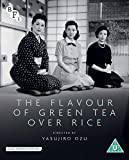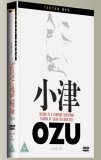 Flavour of Green Tea Over Rice (DVD + Blu-ray) | Blu Ray | (18/05/2020)
from £18.75
| Saving you £N/A (N/A%)
| RRP
Flavour of Green Tea Over Rice (DVD + Blu-ray) | Blu Ray | (18/05/2020)
from £18.75
| Saving you £N/A (N/A%)
| RRP Made the year before his career defining masterpiece, Tokyo Story, Flavour of Green Tea Over Rice is one of Yasujiro Ozu's most beautiful domestic sagas, a subtly piercing portrait of a marriage coming quietly undone. Secrets and deceptions strain the already tenuous relationship of a childless, middle aged couple, as the wife's city bred sophistication clashes with the husband's small town simplicity, and a generational sea change in the form of their headstrong, modern niece sweeps over their household. Ozu's expert grasp of family dynamics receives one of its most spirited treatments, with a wry, tender humour and an expansiveness that moves the action from the home, to the baseball stadiums and the shops of postwar Tokyo. Presented in High Definition and Standard Definition ***FIRST PRESSING ONLY*** Fully illustrated booklet with new writing on the film and full film credits Extras TBC
![Drunken Angel [1948]](/pictures/1010992.jpg) Drunken Angel | DVD | (25/07/2005)
from £13.99
| Saving you £6.00 (42.89%)
| RRP
Drunken Angel | DVD | (25/07/2005)
from £13.99
| Saving you £6.00 (42.89%)
| RRP Post-war Japan anatomised in the combative relationship between an alcoholic doctor (Takeshi Shimura) and his patient (Toshiro Mifune) a wounded young gangster. This is the film that was considered to be Kurosawa's breakthrough movie illuminating themes that would go on to dominate his succeeding work. 'Drunken Angel' also marked his first - of many - collaborations with Toshiro Mifune here playing the tubercular Yakuza hoodlum.
![Late Mizoguchi - Eight Films 1951-1956 [Masters of Cinema] [DVD]](/pictures/1105743.jpg) Late Mizoguchi - Eight Films 1951-1956 | DVD | (24/01/2011)
from £N/A
| Saving you £N/A (N/A%)
| RRP
Late Mizoguchi - Eight Films 1951-1956 | DVD | (24/01/2011)
from £N/A
| Saving you £N/A (N/A%)
| RRP Kenji Mizoguchi looms over the history not only of Japanese cinema - but of world cinema altogether. These eight films from the last decade of Mizoguchi's career represent a collection of eight of his greatest works which is to say eight of the greatest films ever made. Oy-sama (1951) is an adaptation of Tanizaki Jun'ichir: a poignant tale of two sisters and their ill-fated relationship with the same man: a tale of the social mores and affairs of the heart that might destroy siblings. Ugetsu monogatari (1953) a ghost-tale par excellence and one of the most highly acclaimed works of the cinema is an intensely poetic sublimely lyrical tragedy of men lured away from their wives which consistently features on polls of the best films ever made. Gion-bayashi (1953) is a drama set in the world of the geisha a subtle masterwork that yields myriad insights into the lives of Japan's service-class in the early '50s. Sansh-day (1954) recounts an unforgettably sad story of the 11th century involving kidnapping and indentured servitude - and figures again with its exquisite tone and purity of emotion as one of the most critically revered films of any era. Uwasa no onna (1954) another Mizoguchi picture set in a modern geisha house pits mother against daughter with the ensuing drama forcing both to confront their attitudes toward family and business in what is one of the filmmaker's most astute filmic examinations of oppressed femininity. Chikamatsu monogatari (1954) the tragic story of a forbidden love affair between a merchant's wife and her husband's employee was hailed by the legendary Akira Kurosawa as a great masterpiece that could only have been made by Mizoguchi. Ykihi (1955) recounts an 8th-century Chinese story of a widowed emperor and his imperial concubine filmed in sumptuous hallucinatory Agfa-stock colour. Akasen-chitai (1956) aka Street of Shame is Mizoguchi's final masterpiece and one of the greatest last films ever made depicting the goings-on in a Tokyo brothel carrying the name Dreamland where dreams are nevertheless shattered beneath the weight of financial necessity and all questions of conscience - a last testament which inspired the great French critic Jean Douchet to proclaim: For me along with Chaplin's Monsieur Verdoux and Renoir's La Rgle du jeu the greatest film in the history of the cinema.
 The Samurai Trilogy | DVD | (30/10/2004)
from £N/A
| Saving you £N/A (N/A%)
| RRP
The Samurai Trilogy | DVD | (30/10/2004)
from £N/A
| Saving you £N/A (N/A%)
| RRP The Samurai Trilogy is based around the life of the historical character Musashi Miyamoto. Born around 1584 he perfected the technique of two sword fighting as well as developing into a considerable Zen black ink artist. Having fought his first duel at the age of thirteen he was involved in 60 other engagements before his death in 1645. Musashi Miyamoto: The first episode of the trilogy covers Miyamoto's formative years as he emerges from rural obscurity to search for fame and glory in civil war but returns home a broken man. Brought back to sanity through the love of a warm hearted girl she persuades him to place himself under the spiritual guidance of an unorthodox Buddhist priest. His methods of teaching the ways of enlightenment would make the fiercest of Zen masters seem positively gentle. Gaining in spiritual stature and insight Miyamoto is forced to choose between settling for domestic happiness or continuing his search for perfection in the art of the sword. Several versions of Miyamoto's life have been produced for cinema and television in Japan but none more prestigious than Inagaki's Samurai Trilogy. Winner of the Academy Award for Best Foreign Language Film in 1955 this first film in the trilogy was also Toho's first foray into colour. Duel At Ichijoji Temple: At first a contemptuous wanderer whose only interest is to prove his prowess against the best Japan has to offer Miyamoto is brought to understand that mastery of the sword is mastery of the self. Along the way he moves from casually committing slaughter to adopting a more compassionate and merciful view of his fellow warriors... Duel At Ganryu Island: His destiny continues to pursue him! Settling down to a life on the land in a peasant village Miyamoto is drawn into protecting the villagers against marauding bandits. And beyond this battle lies the ultimate contest with the driven and obsessive Kojuo Sasaki. The epic closes in a stunning sunset duel...
![Sansho Dayu/Gion Bayashi [Masters of Cinema] [1953]](/pictures/1076471.jpg) Sansho Dayu/Gion Bayashi | DVD | (19/11/2007)
from £N/A
| Saving you £N/A (N/A%)
| RRP
Sansho Dayu/Gion Bayashi | DVD | (19/11/2007)
from £N/A
| Saving you £N/A (N/A%)
| RRP Based on an ancient legend as recounted by celebrated author Mori Ogai (in his short story of the same name written in 1915) and adapted by Japanese director Mizoguchi Kenji Sansho Dayu is both distinctively Japanese and as deeply affecting as a Greek tragedy. Described in its opening title as ""one of the oldest and most tragic in Japan's history"" Mizoguchi depicts an unforgettably sad story of social injustice family love personal sacrifice and fateful tragedy. Set in Heian era (11th century) Japan it follows an aristocratic woman Tamaki (played by Tanaka Kinuyo who also stars in Mizoguchi's Ugetsu Monogatari) and her two children Zushio (Hanayagi Yoshiaki) and Anju (Kagawa Kyoko) who are separated by feudal tyranny from Tamaki's husband.
 Ozu - Record of a Tenement Gentleman / Flavour of Green Tea over Rice | DVD | (27/06/2005)
from £N/A
| Saving you £N/A (N/A%)
| RRP
Ozu - Record of a Tenement Gentleman / Flavour of Green Tea over Rice | DVD | (27/06/2005)
from £N/A
| Saving you £N/A (N/A%)
| RRP Regarded by many as one of the world's finest directors and renowned for his most 'Japanese' of styles Yasujiro Ozu made his first film in 1927 and went on to direct 55 features before his death in 1963. It was after his passing that the interest in the films of his contemporaries Bunuel Bergman and compatriot Kurosawa resulted in a small tour of his films in the US and screenings at international film festivals ensuring that his films and style are recognised worldwide. This beaut
![Duel At Ichijoji Temple [1955]](/pictures/1003835.jpg) Duel At Ichijoji Temple | DVD | (20/02/2003)
from £N/A
| Saving you £N/A (N/A%)
| RRP
Duel At Ichijoji Temple | DVD | (20/02/2003)
from £N/A
| Saving you £N/A (N/A%)
| RRP The Samurai Trilogy is based around the life of the historical character Musashi Miyamoto. Born around 1584 he perfected the technique of two sword fighting as well as developing into a considerable Zen black ink artist. Having fought his first duel at the age of thirteen he was involved in 60 other engagements before his death in 1645. Several versions of his life have been produced for cinema and television in Japan but none more prestigious than Inagaki's Samurai Trilogy. Winne

Please wait. Loading...
This site uses cookies.
More details in our privacy policy